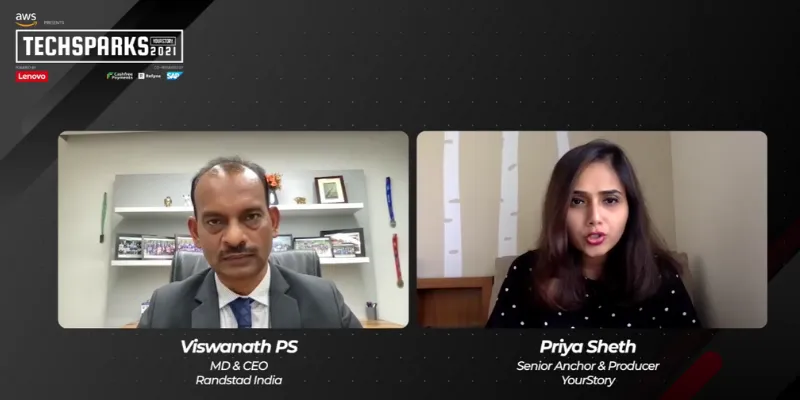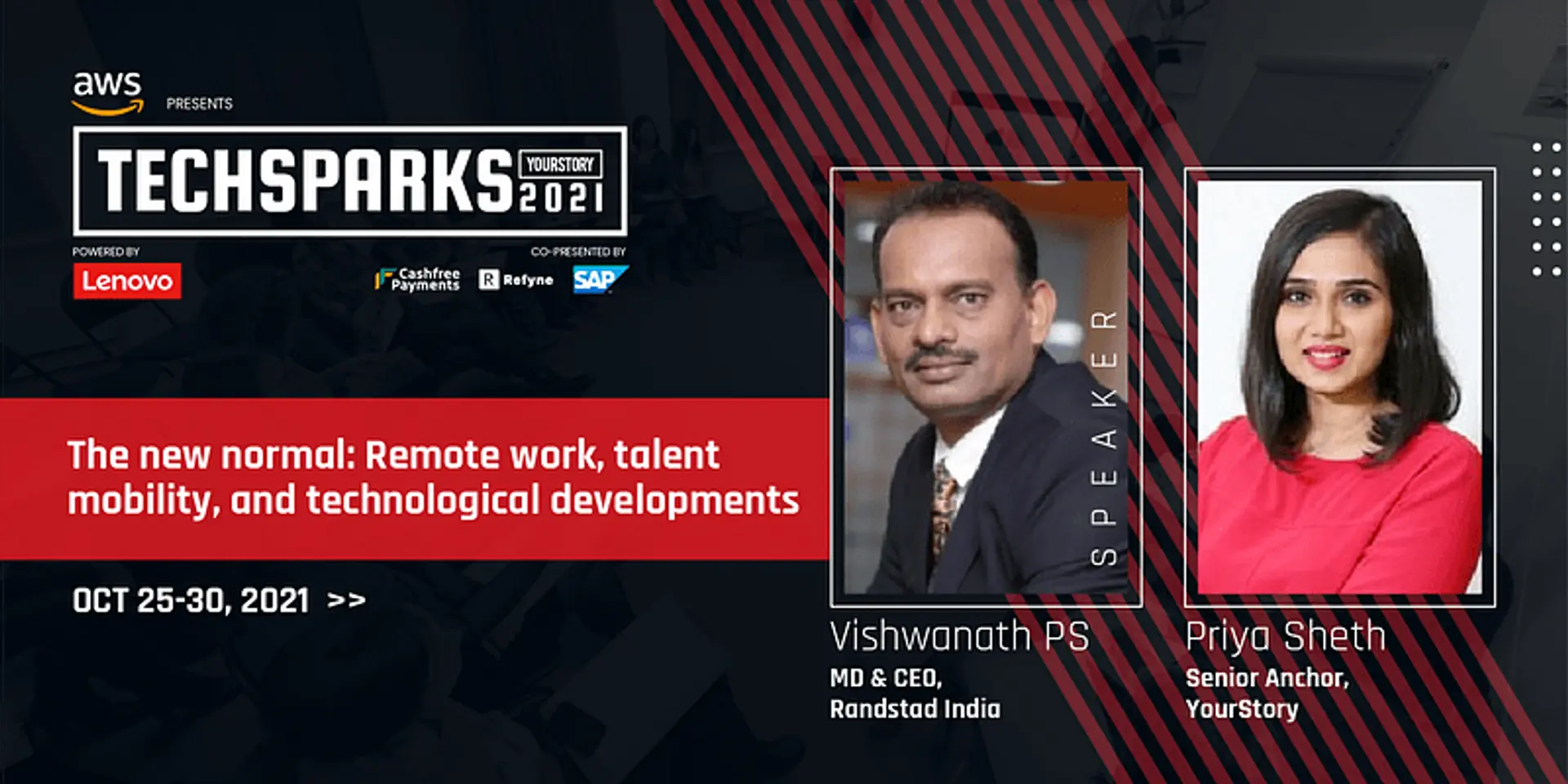Continuous learning and upskilling will help employees tap into in-demand jobs, says Viswanath PS of Randstad India at TechSparks 2021
At TechSparks 2021, Viswanath PS, Managing Director & CEO, Randstad India, emphasised why it's necessary for companies to invest in the cloud, upskill employees and provide flexibility.
The pandemic has dramatically changed the way we live and work, affecting virtually every element of life. Although the last 1.5 years were tough for both employees and employers, the power of endurance is what helped them sail together.
"Our strength lies in resiliency, the courage to face challenges which helped us navigate the pandemic well," said Viswanath PS, Managing Director and CEO, Randstad India, in a fireside chat at TechSparks 2021, YourStory's flagship startup-tech event.
The lurking fear of the third wave, according to him, seems to have disappeared and the job market looks quite attractive at the moment. Companies are forging from just doing business as usual to accelerating their plans and preparing for the future. Remote working, on the other hand, was barely talked about prior to the pandemic. Now it's here to stay.
From work-from-office to work-from-home and work-from-anywhere, companies have stepped up to offer flexibility to employees. They've also heavily invested in technology platforms and the cloud to reduce operating costs.

Upskilling to tap into jobs in demand
The pandemic disrupted the labour market and caused short-term, sudden and severe consequences. Millions lost jobs, many were furloughed and others had to rapidly adjust to working from home. As per a report from the Centre for Monitoring Indian Economy (CMIE), India's unemployment rate stood at 12.4 percent.
But in the long term, it resulted in a demand for digital skill-based jobs. "It's not about talent shortage in India. We have the talent, the question is if people are ready to take up these jobs," he said.
The biggest surge in demand is in the IT field as companies gear up to digitally transform operations through the cloud. This is followed by AI, ML, Blockchain and Data Analytics.
In the blue-collar sector, ‘Make in India’ initiatives and businesses like electric cars, commercial vehicles space have opened up huge job opportunities. The pharma and healthcare sector is also witnessing a huge surge in demand for nurses and doctors.
To tap into these opportunities, continuous learning and upskilling are required. "Spend 5-10 hours a week learning something new or you'll become obsolete," said Viswanath. He added that employees must find multiple sources of wisdom - read blogs, listen to podcasts, share knowledge wealth, embrace change and keep up with the latest technology.
Leaders need to hire lifelong learners, provide them with access to relevant learning platforms, help them be agile, and reward those who adapt quick learning cycles. Governments too must do their bit to contribute to upskilling professionals.
How to retain existing talent
Even though a lot of employees state 'better offers' as a reason to leave a particular job, most often it's because of other reasons like toxic environment, lack of purpose in job role, boredom, bad managers, no recognition, and micromanagement.
The COVID-19 pandemic has accelerated the need for organisations to relook at their workplace strategies. The Accenture Future of Work Study 2021 showed that 63 percent of high-growth companies have adopted the productivity-anywhere workforce model.
Viswanath said that the focus should be more on the outcome and not the number of hours employees put in. Company policies should also accommodate work-life realities which are now more important in a hybrid environment.
"For organisations to outperform, it's imperative to recognise the changing fabric of the talent and the client community. It's about understanding the pulse of the organisation and the employees," he said.
How salary trends have shaped up
According to Viswanath, in the last three years, the salaries in India had settled at 7-8 percent. During the pandemic, companies looked to cut costs. While some gave lower raises, others completely cancelled appraisals. But in the last one year, most companies have bounced back and hit record levels of growth and profitability.
As a leading player in the HR services industry, Viswanath said that at Randstad, they don't look at 2020 as the baseline when giving a raise, instead, they compare it with 2019.
He added, "Today, there's going to be a slight shift from pay for performance to pay for resilience. It's the employer's way of thanking employees for contributing through the crisis. It's also about retaining high-performers and attracting talent at a slightly higher premium to be future-ready."
Now, increments have increased to 9-10 percent and for certain jobs with skills in demand it will be 16-20 percent.
Startups looking to take their ideas to the marketplace are willing to pay a premium to attract the right talent in order to succeed. "It's a risk and reward philosophy for startups. The reward is not just compensation, they offer ESOPs and other retention plans," he said.
Hybrid will be the future
A recent EY survey showed that more than half of employees globally would quit their jobs if not provided post-pandemic flexibility. "Work from home has allowed employees to redefine their purpose, strike the right balance in work and life, and with less commute time, there is more productivity," said Viswanath.
While hybrid is here to stay, the challenge, he said, will be to provide the same level of experience to people working in the office, at home or from anywhere.
He concluded, "HR leaders have now put on their thinking caps to strategise on how to make employees experience the company's culture remotely. Innovation will play a huge role in this matter."
To log in to our virtual events platform and experience TechSparks 2021 with thousands of other startup-tech enthusiasts from around the world, join here. Don't forget to tag #TechSparks2021 when you share your experience, learnings and favourite moments from TechSparks 2021.
For a line-up of all the action-packed sessions at YourStory's flagship startup-tech conference, check out TechSparks 2021 website.







